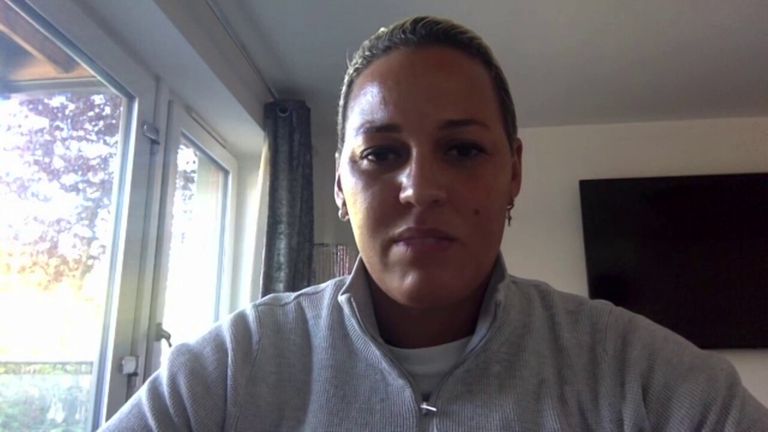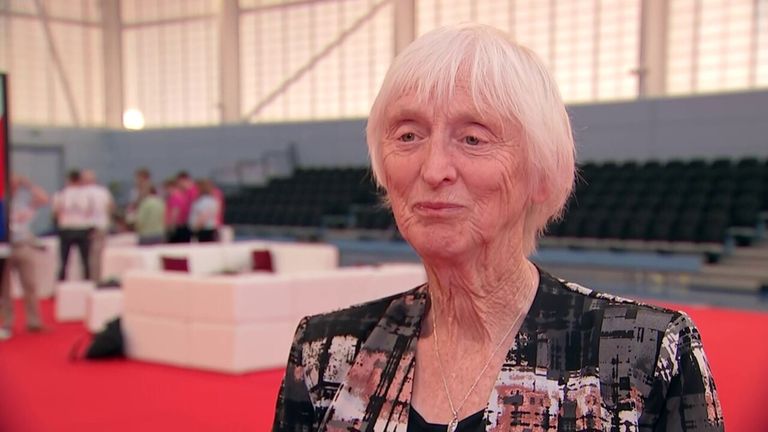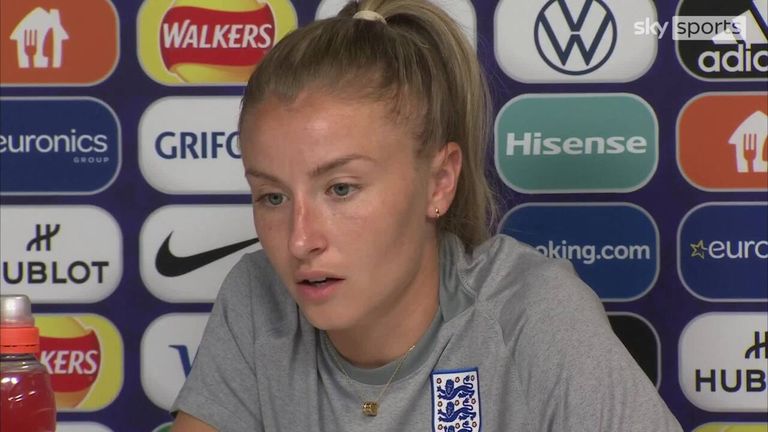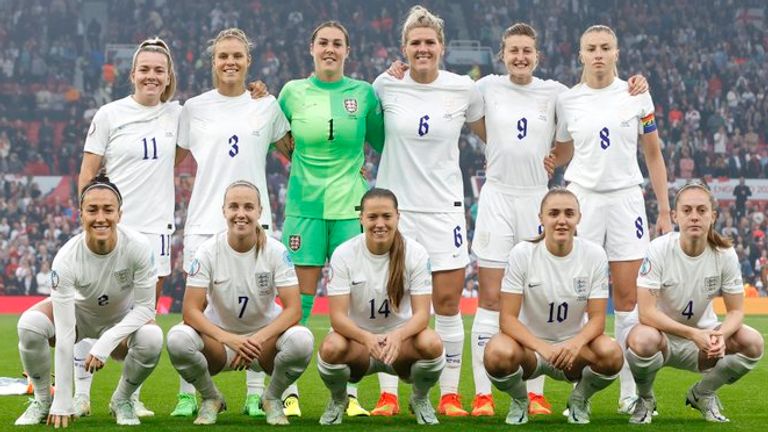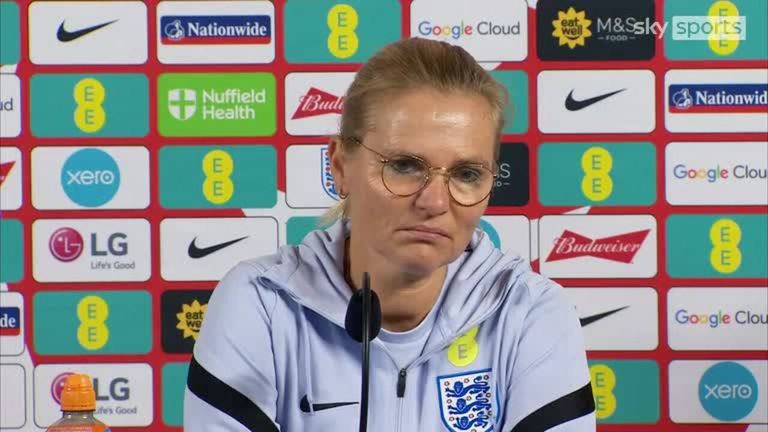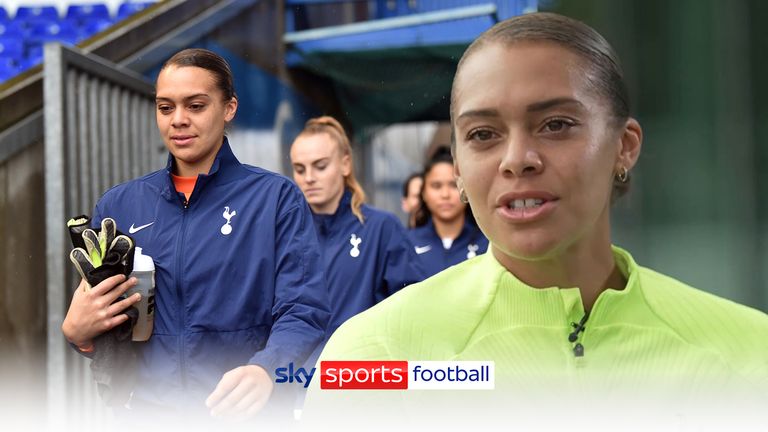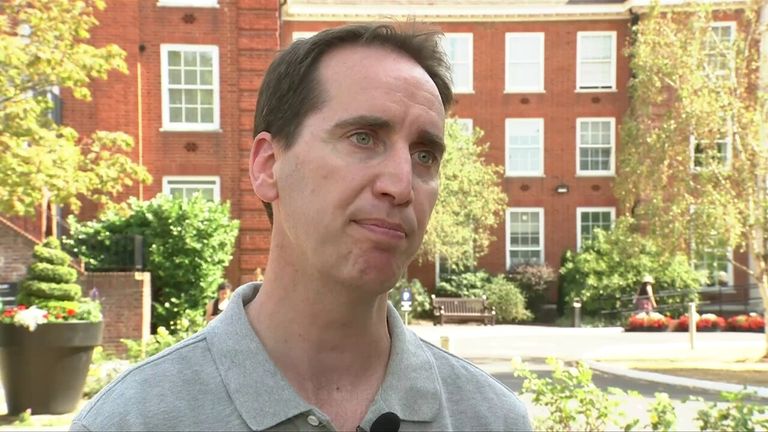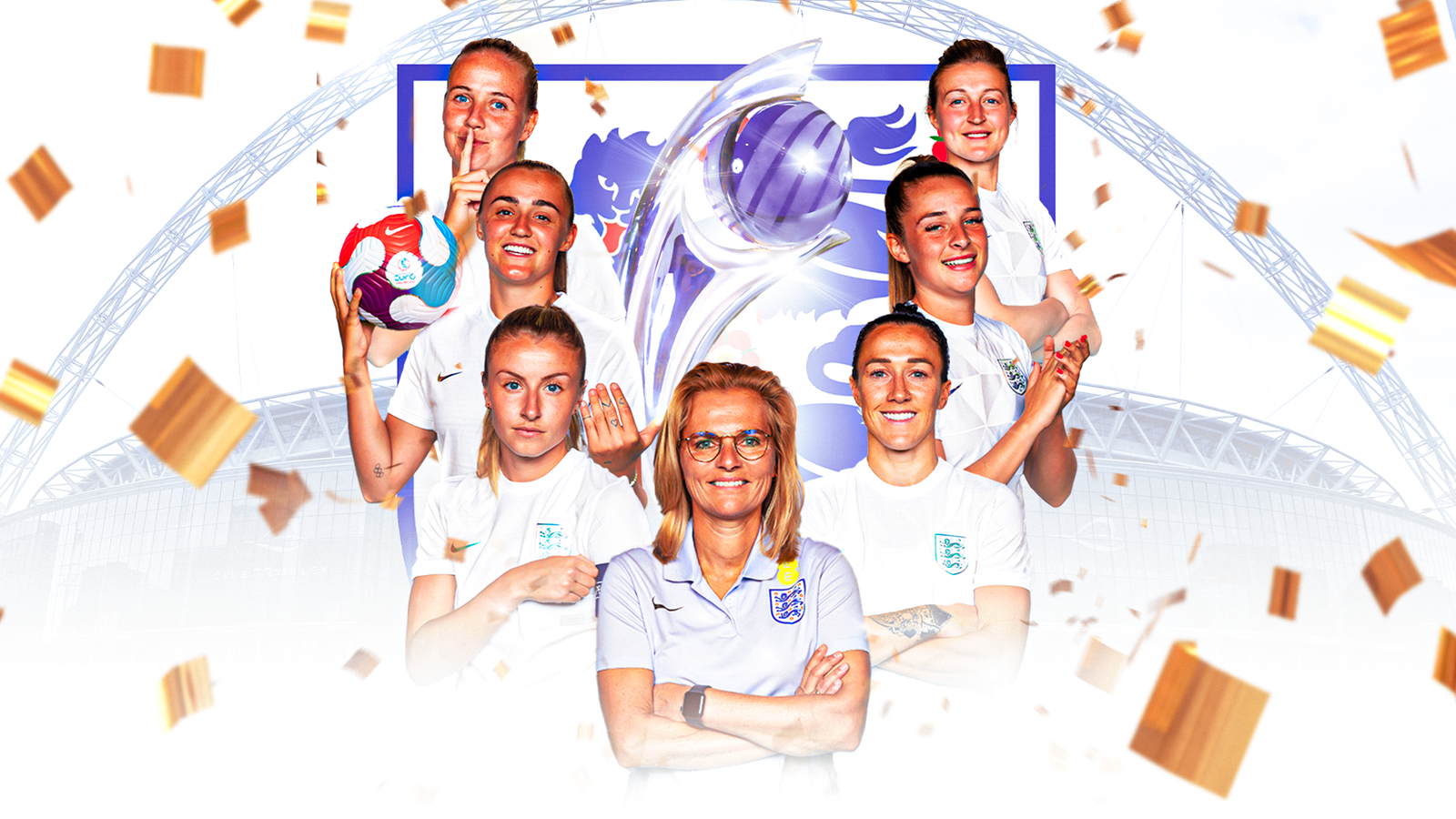
Courtney Sweetman-Kirk says football must show “a genuine desire for change” to tackle the lack of diversity in elite girls’ and women’s football.
Sweetman-Kirk’s comments come after England manager Sarina Wiegman told Sky Sports News before Friday’s 4-0 win over Japan she “would love to see more Black players in the team”.
England named three mixed-Black heritage players in their Women’s Euros squad this summer but fielded an all-white starting XI in every match of their stunning tournament triumph, reigniting the debate over the lack of ethnic diversity in elite girls’ and women’s football. According to the PFA, just 9.7 per cent of footballers in the elite women’s game are from diverse ethnic backgrounds, compared to 43 per cent of male players in the Premier League.
Wiegman added on Friday: “We need to do more and we are doing more. The FA is doing more to give access to anyone who wants to play football.”
England Women’s forward Ella Toone pointed to the open letter to the Government penned by the Lionesses after their Euro 2022 success, asking for girls to have equal access to football in PE lessons, as proof the squad are committed to creating a genuine legacy for women’s football.
Toone told Sky Sports News on Sunday. “A lot more can be done. We want to get as many people as we can involved in football and as many backgrounds as we can.”
But Sweetman-Kirk has called for meaningful dialogue with football’s stakeholders, insisting there needs to be much greater enthusiasm and energy to really focus on ethnic diversity in the women’s game.
The Sheffield United forward said: “I think for young girls growing up and looking at that squad, there are a lot of young white girls, which is fine, but in terms of South Asian, mixed race and Black girls looking up and thinking ‘I want to be like that’, they’ve not got many role models to look up to.
“There needs to be a desire for change and actually to open up a conversation.
“There needs to be change. We need to have these discussions. People almost need to be allowed in a way to be wrong because it’s easy to jump on people but sometimes to open yourself up to that conversation, you need to almost be a little bit wrong and have room to be educated.
“So we need to have these conversations. We need to make sure that we want to do something about it.
“But after that, whether it be the England Women, or whether we are talking about Kick It Out or taking the knee – we always see these sorts of things happening and these conversations had – but what is the action behind it?
“We spoke about Yanks (Rachel Yankey), Anita Asante – these historic England females who have been involved in The Game. If I’m the FA, I’m getting them involved.
“I’m talking to Alex Scott, talking to Rachel Yankey, talking to Anita Asante, Lianne Sanderson as well – who is a fantastic advocate for the game – to say ‘Right, where are we going? What can we do? What do you think the barriers are facing those communities and how can we change that?’.
“Hopefully, those discussions are being had.”
The Football Association has been approached for comment but was unable to provide any ethnicity data on diverse representation within girls’ and women’s elite pathways when recently contacted by Sky Sports News.
The FA said its key aims are to provide greater access for more players while diversifying the talent pool, pointing to its Discover My Talent initiative and referring Sky Sports News to its Inspiring Positive Change strategy update Asian Inclusion Strategy update and wider Diversity and Inclusion strategy.
Mead’s comments ‘probably a bit ill-informed and a bit uneducated’
England’s Beth Mead defended herself after the win over Japan over comments attributed to her in an interview with The Guardian in which she was quoted as saying the lack of ethnic diversity in the England Women squad was “a coincidence”.
Mead, who won her 50th cap in the game and has since withdrawn from the squad due to family circumstances, told Sky Sports News the article was “unfair” and not a “true reflection” of herself.
Prior to her response, Arsenal legend and ITV pundit Ian Wright said there is a systemic problem in the women’s game, adding he had spoken with Mead about her comments, which were described by former England international and fellow pundit Eni Aluko as “clumsy”.
“I’m very fond of Beth,” Wright said in the studio. “Yes, it was a bit disappointing seeing that. What was said will obviously stay between us but I think it was a massive moment of reflection and learning for her.”
Sweetman-Kirk said Mead’s comments at best were “probably a bit ill-informed and a bit uneducated” because of the systemic racism and inequalities that plague the girls’ and women’s game.
Sky Sports News pundit Clinton Morrison added: “This always come up when a comment comes up. We should be talking about this nearly every day to try and change it.
“It’s always the same. This stuff has come up because of Beth Mead’s comments. Now we are talking about it.
“There should be more Black people, Asian people mixed race people, youngsters coming through and playing in that England squad.
“If Sarina Wiegman at the moment doesn’t think they are good enough to get into that squad, that’s fair enough, you have to respect her, she is a fantastic manager.
“But we shouldn’t just be talking about it because of the comments that have just been made by Beth Mead where she [says she] has been misquoted.”
Wiegman confirmed that conversations have been held with Mead after her post-match interview, adding: “There have been conversations. I absolutely think she has been totally misinterpreted. But I know Beth, she is an incredible person, her values are really, really good.”
Morgan: ‘Too much lip service’ on Talent ID
Former Leicester Women captain Holly Morgan on Sky Sports News:
“The conversation has been quite loud around the Lionesses, and I think it’s really important to stress that when you look at the Lionesses team, it is predominantly white, but that’s not coincidental.
“The FA have acknowledged and accepted that when the game did professionalise, they knew that they needed to reduce the number of centres (Regional Talent Clubs) and they moved to more suburban areas – and they knew that in order to do that it would make the game less inclusive.
“So, it’s not a coincidence that when you look at the England team now that it is predominantly white – because when you move talent centres away from people, and it is not accessible to all, you’re not going to get a diverse group of people competing in this game.
“From my point of view when I watched the Lionesses, I think it was a fantastic achievement winning the Euros, but I’m looking at that team and I don’t feel as connected, because I’m looking and thinking about all of those that could have been there, who weren’t able to realise their potential, because the sport wasn’t accessible for them.
“I think going forward for the FA – I know they have got schemes and initiatives to kind of make football more inclusive – but there needs to be a lot more done around unconscious bias training in clubs, diversity and equality training in clubs, because it’s not just about accessibility, it’s also about a system that’s not always for Black, Asian and mixed heritage players – and that’s something that has to be looked at.”
On scouts not visiting certain communities to identify talent, Morgan said: “Sometimes it is a bit too much lip service and not enough action to actually go into these areas and find this talent.
“A lot of people say you have to see it to believe it, you have to see it to dream it, that you can be there and do what these role models you are looking up to [are doing].
“So, we need to be going into more areas to give hope. And it’s not just going in, seeing some players but then leaving them on the side, it’s actually going in with a plan that’s going allow them to flourish for their journey.
“Whether they make it to the Lionesses, whether they make it to the Super League or whether they make it to tier three, four, five, wherever, players need to know that they are being seen and that they are not just being left there on the side.”
How Sky is trying to make change
Sky Sports recognised and began taking steps to address the lack of diversity in the women’s game back in 2020 as part of its £30m commitment to tackle systemic racism and make a difference in communities across the UK.
Sky Sports has worked with dozens of current and former players from diverse ethnic backgrounds, and has tried to give them a platform to share their stories to try and capture the imagination in order to help inspire the next generation of female footballers.
Talent has been identified and signposted directly to the Football Association and other international federations, and professional clubs, as part of Sky Sports’ unprecedented commitment to British South Asians in Football, which has also seen us devote a section of our website to raising awareness about South Asians in The Game.
A number of elite and elite-potential female players and their families have also been supported with mentoring and access to off-field developmental opportunities.
Earlier this year, Sky Sports also partnered with the country’s largest sports race equality charity, Sporting Equals, which has seen us support participation across the country, including devising the ‘Seeing Is Believing’ event for century-old west London sports club Indian Gymkhana.
British South Asians in Football
For more stories, features and videos, visit our groundbreaking South Asians in Football page on skysports.com and stay tuned to Sky Sports News and our Sky Sports digital platforms.
FA guidance on diversity in the women’s game
The Football Association recently confirmed the first 60 Girls’ Emerging Talent Centre [ETC] licences to be allocated, which will see the number of young female players engaged in FA programmes across the country rise from 1,722 to over 4,200 by the end of the 2023-24 season.
Our key aims are to provide greater access for more players whilst diversifying the talent pool, and early signs show we are well on track to achieve those aims.
Discover My Talent is a Talent ID initiative which aims to provide access and opportunity to the Women’s England Talent Pathway for any girl, from any community in England.
Working with key stakeholders the programme encourages referrals from any organisation or individual for players who may possess the technical, physical or social characteristics of talent players across the 2006 – 2010 year born.
We recognise that players’ journeys are uniquely different and due to the limited number of professional women’s clubs across the country, this provides a challenge for young girls to access. We also acknowledge the positive impact that mixed football has had on talented female players coming through the talent system, which we should embrace and accept the difference pathways that players may choose in which to develop.
It is our intention to support clubs to increase their playing pool through youth their teams, providing more depth in talent and provide players who representative their communities. Discover My Talent is a nationwide Talent ID programme that reaches every part of England and it’s job is not only to find talent in areas that may have previously not been able to access the opportunities, but also to provide support to young players and their families enabling them to reach their full potential.
British South Asians in Football
For more stories, features and videos, visit our groundbreaking South Asians in Football page on skysports.com and stay tuned to Sky Sports News and our Sky Sports digital platforms.
This news is republished from another source. You can check the original article here



